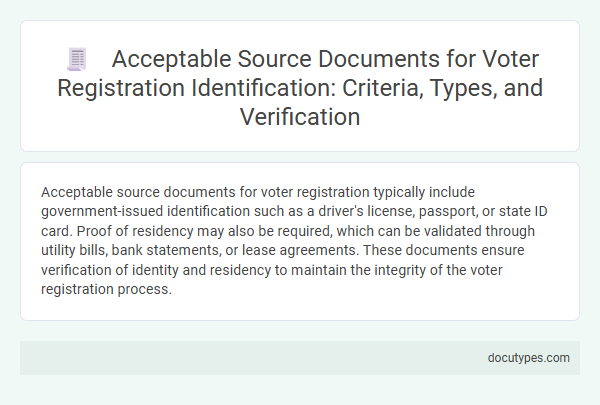Acceptable source documents for voter registration typically include government-issued identification such as a driver's license, passport, or state ID card. Proof of residency may also be required, which can be validated through utility bills, bank statements, or lease agreements. These documents ensure verification of identity and residency to maintain the integrity of the voter registration process.
Introduction to Voter Registration Identification
Voter registration requires the submission of valid identification to verify an applicant's identity and eligibility. Acceptable source documents ensure the accuracy and integrity of the registration process.
Commonly accepted documents include government-issued photo IDs, such as driver's licenses or passports. Some jurisdictions also accept utility bills or other official documents that confirm residency.
Criteria for Acceptable Identification Documents
Acceptable source documents for voter registration must meet specific criteria to verify identity and residency effectively. These documents ensure the accuracy and legitimacy of the voter registration process.
- Government-issued photo ID - A valid driver's license, passport, or state ID card displaying the registrant's full name and photograph.
- Proof of residency - Utility bills, bank statements, or lease agreements that include the voter's name and current residential address.
- Birth certificate or Social Security documentation - Official records used to confirm identity when photo ID is not available, often supplemented by proof of residency.
Meeting these criteria helps maintain secure and accurate voter registration systems.
Primary vs. Secondary Source Documents
| Category | Source Document | Description | Example |
|---|---|---|---|
| Primary Source Documents | Government-Issued Photo ID | Official identification issued by a government agency displaying a photo and full name. | Driver's License, State ID Card, Passport |
| Birth Certificate | Official record of birth issued by a government vital statistics office showing proof of identity and date of birth. | Certified Birth Certificate | |
| Social Security Card | Document issued by the Social Security Administration containing a unique number for identification. | Social Security Card with matching name | |
| Naturalization Certificate | Proof of citizenship for naturalized citizens provided by the U.S. Citizenship and Immigration Services. | Certificate of Naturalization | |
| Secondary Source Documents | Utility Bill | Document verifying residential address, used when primary ID does not include address. | Electricity, Water, Gas Bill (dated within last 30-90 days) |
| Bank Statement | Official statement from financial institutions showing name and residence address. | Recent Bank Statement | |
| Government Mail | Official correspondence from federal, state, or local agencies addressed to the applicant. | Tax Notice, Social Security Letter | |
| School Records | Documents showing name, date of birth, and enrollment information for identification in some cases. | Report Card, Transcript |
Government-Issued Photo Identification
Government-issued photo identification is essential for verifying your identity during voter registration. Acceptable documents must be current and display your photo clearly.
- State Driver's License - A valid license issued by the state motor vehicle department with your photograph and full name.
- Passport - A current U.S. passport containing your photo serves as a universally accepted proof of identity.
- State ID Card - Official identification cards issued by state authorities with a visible photo and personal details.
Non-Photo Identification Documents
Acceptable source documents for voter registration include various forms of non-photo identification. These documents serve to verify your identity without requiring a photo ID, ensuring accessibility for all eligible voters.
Examples of non-photo identification documents include utility bills, bank statements, government-issued letters, and paycheck stubs. These records must display your name and residential address to confirm eligibility for voter registration.
Proof of Residency Documentation
What are acceptable proof of residency documents for voter registration? Proof of residency is required to confirm a voter's physical address within a voting district. Commonly accepted documents include utility bills, bank statements, lease agreements, and government-issued letters that display the voter's name and current address.
Special Considerations for Student and Military Voters
Acceptable source documents for voter registration include government-issued photo IDs, utility bills, bank statements, and student IDs that display the voter's name and address. Special considerations for student voters allow campus-issued IDs and school transcripts as proof of residence when registering in their college town. Military voters can use their military ID, leave and earnings statements, or official base orders to fulfill voter identification requirements during registration.
Verification Procedures for Source Documents
Verification procedures for source documents are critical to ensure the accuracy and legitimacy of voter registration. Your identification documents must meet specific criteria to be accepted by election officials.
- Government-issued Photo ID - Must display a clear photograph and a valid expiration date to confirm identity and eligibility.
- Proof of Residency Document - Should include a current utility bill, lease agreement, or bank statement with your name and address to verify residency.
- Birth Certificate or Passport - Accepted as official proof of citizenship when accompanied by a secondary ID, ensuring compliance with registration requirements.
Common Issues and Troubleshooting in Document Verification
Acceptable source documents for voter registration typically include a government-issued photo ID, utility bills, or a birth certificate. Common issues during document verification arise from expired identification, discrepancies in personal information, or unclear copies. You can troubleshoot these problems by ensuring your documents are current, match your registration details, and are submitted in legible formats.
What Are Acceptable Source Documents for Voter Registration? Infographic

